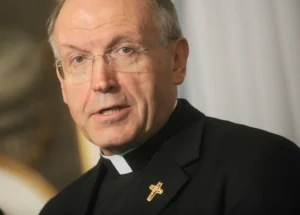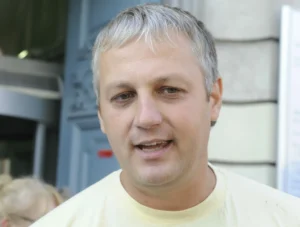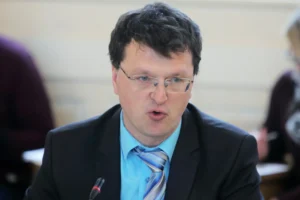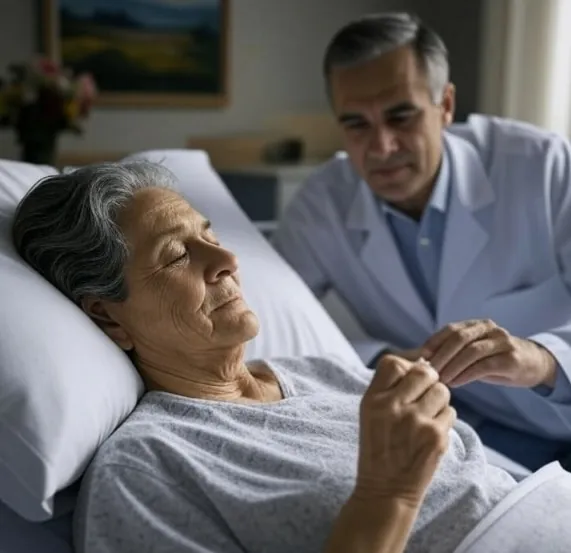“Next week, the government majority will pass a law on poisoning the sick and elderly. According to the logic: a dead man is a good man. With every poisoned person, there will be one less person waiting to receive healthcare, one less person receiving their pension, no more costs for treatment … This is not right. Let’s reject this in a referendum!” said civil society activist Aleš Primc.
The ruling parties have been pushing for a long time for the enactment of a murderous law on medical poisoning. We are, of course, talking about euthanasia, which was once popular among the Nazis – they saw it as a “solution to the problem” of unwanted people. The adoption of the law is scheduled for next week, namely, for Thursday, the 10th of July. In light of this, we have asked some experts for a comment on the topic.
A comment by retired Archbishop Dr Anton Stres:
“There are three reasons why the law on voluntary medically assisted end of life is unacceptable. It doesn’t matter what we call it. The drafters of this law have, of course, chosen very mild and pejorative terms to make it sound nicer. In reality, it is about encouraging suicide, and that is unacceptable, that is the first reason. Although any human distress should be respected when someone can no longer bear a heavy burden, this sympathy does not mean approval. Suicide is always a regrettable act, but it certainly cannot become a normal way of dealing with severe personal hardship. Now, however, the politicians who govern us want to make suicide a regular and normal means of solving serious personal problems. What is more, by this act, the state is directly inciting people in distress to do so. This is perverse. Courage or fortitude has always been considered one of the main virtues of persevering even in the most difficult circumstances. If we add to this the undeniable fact that modern medicine has advanced to such an extent that it effectively relieves the worst pain in the vast majority of cases, then this incitement to suicide is unnecessary. It is an incitement to despair, which is what suicide is in any case.

The second reason against it is the enormous risk of abuse. If this law were to be enacted, it would allow people who have an interest in someone dying and withdrawing to put pressure on them to take their own life in this way, so that they would no longer be an annoyance and a burden to them. If it is the case that every manufacturer must produce non-hazardous products, that a factory that produces car tyres does not produce dangerous tyres, and that the pharmaceutical industry produces safe medicines without too many harmful side-effects, then it is also the duty of our Parliament to ‘produce’ non-hazardous laws, that is to say, laws that do not offer the possibility of abuse.
The third reason why this law should be opposed is the enormous conspiracy behind it. Let us not fool ourselves: this law is only the first step towards the fact that in the near future – if we were to allow the current policy to continue to govern us – people of this ilk would legalise euthanasia in the true and full sense of the word as the actual murder of a human being in the name of compassion or for some other, more perverse reason. The current policy knows that the population is not yet ready to approve euthanasia as the real murder of a fellow human being. If we allow them to take this first step, they will soon try to take the next one, which will be even harder to fight. Isn’t there a saying: ‘The first grudge is better than the second’? That is why we must use all means to prevent this law and its implementation from happening.”
A comment by the Movement for Life – Gibanje za življenje (or its representative, David Rupnik):
“At the MOVEMENT FOR LIFE, we have several questions about the proposed law on artificial termination of life – or as we call it “euthanasia” – that concern us and, in some ways, sadden us, because the proposed law offers solutions that are contrary to our mission.
The mission of our movement is: It wants to help all people, and especially young people, to discover the preciousness of life, the meaning of life, the joy of life, respect, care and responsibility for life, and the courage to live.
A society is only as human as it protects individual life and cares for its weakest members. The pro-life movement highly values life as a priceless gift and respects human life from conception to the natural death, which is why we strongly oppose the Voluntary Termination of Life With Medical Assistance Act. We also demand respect for the constitutional principle of the Republic of Slovenia that human life is inviolable.
What has happened that we are now not being asked to help ourselves to live, but are being asked to help ourselves to die?
In the last days, one wishes not to be in pain and not to be alone. We expect those responsible to ensure that the state can provide for the former by providing adequate palliative care, and for the latter by educating young people and encouraging everyone else to take more joy in life.
We call on all people of good will: let’s help each other to live!”
A comment by the Voice for Children and Families (Glas za otroke in družine):
“Next week, a law on poisoning the sick and the elderly will be passed in the National Assembly! A new signature collection is on the way! Let’s get ready. Next week, on Thursday, the 10th of July, a majority in the National Assembly is very likely to pass the law, with which the government parties want to legalise the medical poisoning of the sick and elderly. We cannot allow that to happen. This means that we will have to collect signatures for the referendum again within seven days.

Stay tuned to next week’s e-Newsletter. When we send out the forms and instructions, follow the collection instructions quickly. Many people are on holiday over the next few weeks, so those of us at home really need to give it our all to get signatures in seven days to protect the sick and elderly from the threat of poisoning.”
A comment by associate professor Dr Roman Globokar, moral theologian:
“The law that will allow for assisted suicide fundamentally changes the view of the value of human life and directly attacks the dignity of the human person and the constitutionally guaranteed inviolability of human life. The law poses a grave danger of shaking the foundations of our civilisation, which are based on unconditional respect for every human being, regardless of their state of health. The law introduces the possibility for a person to decide for him or herself that his or her life is no longer of value and to be assisted by medical personnel to end their life by force. Sick, elderly and infirm people, who often feel like a burden to their relatives and to society, will now actually have the possibility to “get out” of their difficult situation in a quick way.

However, the solution is not to end their life prematurely, but to help patients cope with their illness in a holistic way, by relieving physical pain and compassionately accompanying them with human closeness and spiritual support. Therefore, instead of facilitating physician-assisted suicide, it is necessary to provide a wide-ranging palliative care network through which every patient receives holistic help to relieve physical pain, as well as psychological and spiritual care. Only in this way will we become a more compassionate and solidarity-oriented society, where every human life is of immense value. As Christians, we see each person’s life as a gift from God that we have not given to ourselves, and we must not take it away from ourselves either. Life is something sacred entrusted to our responsible stewardship and care. No one knows what we are destined to do in the process of dying and saying goodbye to this world. Let us not reach for God’s power or try to be the absolute masters of life, but let us accept death as the end of our earthly journey, which we can accept with the solidarity and compassionate help of other people.”
Domen Mezeg


